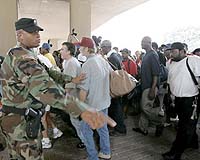Military To Plan For Larger Role In Disaster Relief
 Frances Townsend, the White House homeland security adviser, said the study concluded that the military's role can be enhanced without changing Posse Commitatus, the 1878 law that has kept the active duty military out of domestic law enforcement. Copyright AFP |
Washington DC (AFP) Feb 23, 2006
The US military will plan to assume a larger role in domestic disaster relief, including taking the lead in major catastrophes like Hurricane Katrina, a Pentagon spokesman said Thursday. A White House report on the lessons of Katrina said the military and the coast guard proved to be the only federal entities capable of turning the president's orders into prompt action on the ground.
A key recommendation of the report was for the Pentagon and Department of Homeland Security to plan for "those extraordinary circumstances when it is appropriate for the Defense Department to lead the federal response."
Giving the military the lead in domestic operations is a sensitive issue because US laws and traditions have barred it from engaging in domestic law enforcement.
The legal impediments contributed to the delayed deployment of US active duty troops in response to Hurricane Katrina, which devastated the US Gulf coast last August.
Another source of confusion were conflicting lines of authority over troops in the stricken area, the report found.
National Guard units answered to their state governors while the active duty forces served the president, said the report, which called for a unified command.
The military brought communications, logistics and planning capabilities that were critical to the Katrina relief operations.
But the report said the response was slow and bureacratic because federal agencies had to make specific requests for help for the military to act. As a result, critical needs were not met.
"One could imagine a situation in which a catastrophic event is of such a magnitude that it would require an even greater role for the Department of Defense," the report said.
"For these reasons, we should both expedite the mission assignment request and the approval process, but also define the circumstances under which we will push resources to state and local governments absent a request."
Frances Townsend, the White House homeland security adviser, said the study concluded that the military's role can be enhanced without changing Posse Commitatus, the 1878 law that has kept the active duty military out of domestic law enforcement.
"If you have integrated the National Guard and active duty forces this shouldn't be an issue," she said.
"National Guardsmen are trained and have law enforcement functions in a way active duty forces do not. And so you can preserve the bright line and not seek additional authorities," she said.
She said the study also decided the president's existing authorities were sufficient to allow him to order the deployment of active duty troops in domestic disasters.
During Katrina, the White House held off on federal troop deployments to Louisiana for days while wrangling with governor Kathleen Blanco over who had authority over troops in her state.
Bryan Whitman, a Pentagon spokesman, said work will now beging on rewriting the National Response Plan to redefine the role of the military in natural disasters.
Such basic questions as what would constitute a major catastrophic event must still be sorted out with other members of the president's Homeland Security Council, he said.
"That will be the goal of writing the National Response Plan, to define those things, to have a process in which you can make decisions rapidly to make determinations as to whether it reaches that threshhold," he said.
No comments:
Post a Comment